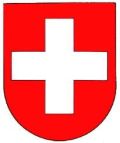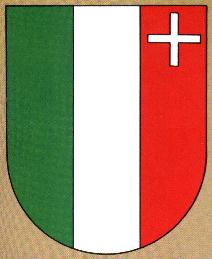Neuchâtel (canton): Difference between revisions
Knorrepoes (talk | contribs) m (Text replace - "[[Literature" to "{{media}} [[Literature") |
Knorrepoes (talk | contribs) m (Text replacement - "{|width="100%" style="color:black; background-color:#ffffcc;" |width="15%"|50 px|left |width="70%" align="center" |'''Heraldry of the World<br/>Civic heraldry of Switzerland - Schweizer Wappen / Armorial de Suisse''' |width="15%"|50 px|right |}<seo title="Wappen, Gemeindewappen, Schweizer Wappen, Armorial de Suisse, Armoires, Blason" />" to "{{ch}}") |
||
| Line 1: | Line 1: | ||
{ | {{ch}} | ||
Revision as of 06:43, 5 July 2015
Swiss heraldry portal
This page is part of the Swiss heraldry portal |
Heraldry of the World |
|
Swiss civic heraldry:
|
Other heraldry: |
NEUCHÂTEL
Official blazon
Origin/meaning
Until 1848 the area belonged to Prussia. On the 1st of March 1848 the Canton declared itself a republic and part of Switzerland. On April 11, 1848 the official colours of the Canton were determined, being green, white and silver. These colours were deliberately chosen, as they bore no resemblance to the old colours of the County Neuchâtel (see the arms of the city of Neuchâtel). In addition the use of a cross in the red part of the flag was adopted. This created a flag, which, with the exception of the cross, were identical to the Italian flag. There was no description of the use of a new coat of arms for the republic.
During the 19th century the flag was sometimes transformed into arms and the present arms were often used, but never officially adopted. In the 1950s the Council of the Canton decided to adopt the original arms of the County of Neuchâtel, but keep the flag. However, this decision was rejected in the referendum in 1954. Ever since the arms are considered the official arms, but they have not been officially adopted.
Contact and Support
Partners:
Your logo here ?
Contact us
© since 1995, Heraldry of the World, Ralf Hartemink 
Index of the site
Literature : Mühlmann, L. : Wappen und Fahnen der Schweiz, Bühler Verlag, Lengnau, 1977 and 1997.












